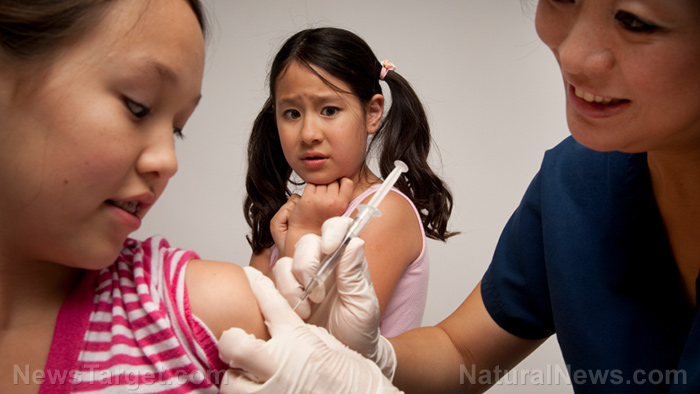Measles vaccines kill more children than the measles… and it’s not even close
05/01/2019 / By Ethan Huff

With all of the hysteria and fear-mongering about measles that’s sweeping mainstream media headlines these days, one might assume that children everywhere are dropping dead from this chickenpox-like infection. But according to official data from the U.S. Centers for Disease Control and Prevention (CDC), not a single person has died while being infected with measles in more than 15 years.
On the other hand, it’s an undeniable fact that at least 100 people have died as a consequence of receiving the MMR vaccine for measles, mumps, and rubella, which we’ve all been told by government health authorities, is supposed to protect against measles.
As is now obvious to everyone who’s actually paying attention, the MMR vaccine is actually far more dangerous than measles itself, which back in the 1950s and 1960s was joked about in television shows like “The Brady Bunch” for being a harmless rite of passage from childhood into adulthood.
Back in 2014, CDC Director for the National Center for Immunization and Respiratory Diseases told the Associated Press that there hasn’t been a measles-associated death since 2003. This claim was more recently confirmed by the CDC’s Division of Viral Diseases, which again reiterated in an email that there have been no measles-associated deaths in the U.S. since 2003.
It’s important to also keep in mind that even those very few deaths reported in 2003 and prior may not have actually been caused by measles, as the CDC merely tracks deaths that coincide with measles infections – much like the CDC, as well as the U.S. Food and Drug Administration (FDA), do with data targeting raw milk.

“The weekly CDC Morbidity and Mortality Weekly Reports (MMWR) since that date have not revealed any measles deaths either,” explains Brian Shilhavy, an editor for Health Impact News, about supporting CDC data showing that measles is basically harmless, and no more serious than the common cold.
For more news about how the mainstream media, corrupt politicians, and industry-bought health authorities are lying to the public about measles, be sure to check out Propaganda.news.
Measles mortality rates had already declined to almost nil BEFORE the vaccine industry introduced the first measles vaccine in 1963
In fact, measles may actually be a safer disease than the common cold, as illustrated by dataset showing that mortality caused by measles is extremely uncommon, especially in the era of proper sanitation.
Included in Shilhavy’s article is a graph showing how the measles mortality rate had reached almost zero by around 1950 – more than a decade before the first measles vaccine was introduced in 1963.
What this graph proves, in other words, is that measles vaccines are pretty much worthless, as well as the fact that measles truly is a no-big-deal disease that, once a person recovers from it naturally, confers permanent, lifelong immunity to measles – which can’t be said for measles vaccines, by the way, which only provide temporary and incomplete immunity, at best.
“Before the introduction of measles vaccines in the 1960s, nearly all children contracted measles before adolescence, and parents and physicians accepted measles as a ‘more or less inevitable part of childhood,'” explains Children’s Health Defense (CHD), a pro-health freedom child advocacy group that’s currently in the process of suing Merck & Co., the manufacturer of the MMR vaccine, for falsifying data about the vaccine’s alleged safety and efficacy.
“In industrialized countries, measles morbidity and mortality already were low and declining, and many experts questioned whether a vaccine was even needed or would be used.”
Be sure to read CHD’s full report about measles, natural measles immunity, and the total scam that is the MMR vaccine.
See VaccineDeaths.com for more reporting on vaccine mortality in America and around the world.
Sources for this article include:
Submit a correction >>
Tagged Under:
CDC, Centers for Disease Control and Prevention, Data, deaths, deception, fake immunity, false data, health freedom, immunity, lies, measles, MMR, MMR vaccine, mortality, Mumps, natural infection, rubella, safe and effective, vaccination, vaccine, vaccines
This article may contain statements that reflect the opinion of the author





















